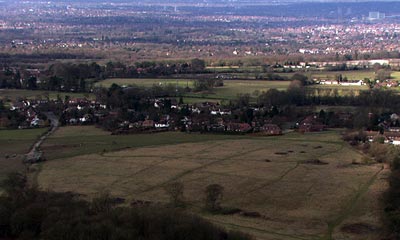Green belt under threat in planning law shake-up
The green belt system came under attack today in a major government report on planning regulations.
Tens of thousands of homes and shops should be built on protected land around cities such as London, according to the radical findings.
The report calls for the biggest shake-up of Britain's planning rules for decades. It warns that current restrictions are harming the economy and slowing house building.

It proposes a series of changes, including:
- Allowing councils to approve building on green belt land.
- A new independent Planning Commission to approve major projects such as nuclear power stations, airports and roads.
- Removing the need for planning permission for homeowners if neighbours agree with an extension.
- Making it easier to build out-of-town shopping centres.
- A new tax on landowners who fail to develop derelict or vacant sites.
- The green belt system, which imposes strict controls on building, has acted as a "corset" around London for 50 years.
The report, by economist Kate Barker, recommends replacing the green belt with "green wedges" or "green corridors" with gaps for homes and other development. She claims that radical change is needed because current restrictions are stifling choice and competition among businesses. Ms Barker adds that rising population means more homes are desperately wanted.
In remarks that will infuriate conservation and rural groups, Ms Barker says that much of the green belt is "low-value agricultural land, with little landscape quality and limited public access".
Her report declares that large swathes of such "urban fringe" land is often run down and should instead be used for homes or businesses.
Ms Barker even claims that parts of the green belt actually harm the environment by forcing commuters to "leapfrog" it with longer journeys to work that produce more harmful emissions. She admits there have been major benefits from the system in preserving historic towns and forcing developers to use inner-city sites.
But Ms Barker warns that there has been a "social cost", with only "higher income groups" able to buy homes in protected areas and poorer families in cities forced to cope with the loss of green space to infill development.
The report claims that while the green belt system is still popular with the public, many people do not understand the economic costs it imposes.
It includes an opinion poll claiming that the public most want to protect land with important wildlife or scenic beauty and are less worried about preserving "land on the edge of towns and cities". Ms Barker said that "some urban developments and new settlements should take place clustered around transport corridors or at the edge of urban areas". She said that the green belt "in some areas, especially the South-East, have become 'green blankets' stretching 20 to 30 miles around cities".
The economist added that some parts of the green belt could be improved with new woodland planting on fields currently unused by farmers.
She highlighted a report which claimed that three per cent of such agricultural land could be used for 950,000 new homes, "so increasing housing affordability for first time buyers".
Friends of the Earth today said that if the Barker proposals are implemented, it will "have a devastating impact on the environment and local democracy".
On planning rules in general, the report advocates similarly radical proposals. Ms Barker states that the current system of giving the Communities Secretary the final say on big projects should be phased out. A new independent Planning Commission would instead determine applications for "major infrastructure" projects for energy, waste, transport and water.
Plans that were "in the national interest", such as nuclear power plants and wind farms, would be subjected to the new system. Ms Barker was asked to comment on criticism that local communities will feel that their fears about big schemes on their doorsteps could be " steamrollered" by the new Planning Commission.
She told a news conference at the Treasury in London: "We know there is a fundamental difficulty. We know that we need to have things in the UK placed somewhere like large energy projects, waste projects. We know that these are the kind of developments that communities, at first sight, are not likely to welcome near them.
"Equally it is in the national interest that these are proposed and provided somewhere."
Ms Barker was scathing about the delays and costs caused by the current planning regulations to both businesses and homeowners.
She said that lengthy delays were hitting economic growth and deterring foreign businesses from setting up in the UK. In one controversial move, the report suggests developers could use "community goodwill payments... to pay households a fixed sum to help gain their acceptance for a project they would otherwise object to".
Ms Barker denied today that such a system would effectively sanction "bribery" of residents. Another crucial change will be to change the presumption in planning to assume that applications will be approved unless their are economic or environmental reasons not to do so. A New Zealand system of "side agreements" could remove the need for planning permission if neighbours agree to minor changes to one of their homes.
thisislondon.co.uk, 05.12.2006
